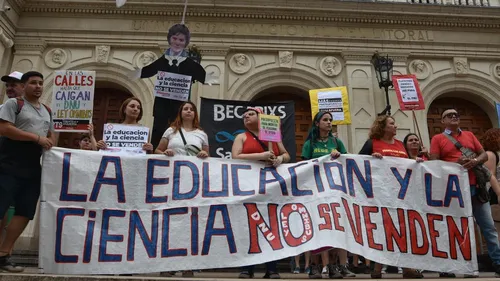
Argentina’s science and education sector is in an alarming situation. Since taking office, ultra-rightist Javier Milei has adopted austerity measures that threaten the continuity of research spaces and the careers of thousands of scientists in the country.
As soon as it took office, the ultra-right government decided to downgrade the Ministry of Science, Technology and Innovation, which was transformed into a secretariat. Furthermore, under the pretext of resolving the serious economic crisis the country is going through, the government decided that during this year it will apply the 2023 public budget. As Argentina is one of the countries with the highest inflation in the world, this measure means a liquefaction of the real budget.
In this context, the National Council for Scientific and Technical Research (Conicet), the main body dedicated to promoting science and technology in Argentina, projects that the annual budget is only enough to cover expenses until June. After that, there will be no more money to maintain the country’s 300 federal research institutes.
The lack of budget has already led to the layoffs of administrative employees at the institution and the postponement of calls for scholarships and promotions in the research career. In this context, the scientific community warns that the current cut of resources in the science and technology system is equivalent to letting it die.
The worrying situation led to several protest demonstrations against the government. Meanwhile, several associations of scientists have declared that they will participate in the general strike with which central workers’ organizations will confront the government’s measures this Wednesday (24).
In conversation with the Brazil in factCecília Gárgano, doctor in history and researcher at Conicet, warns that “the situation is really critical”.
According to the researcher, the cuts are part of “a general context of subjugation and stigmatization of state workers in general, and the scientific sector in particular.” Gárgano highlights that this context had an important chapter during the government of Mauricio Macri (2015-2019) and was radicalized in the current discourse of the extreme right.
“There is a very strong stigmatization of the role of science. This stigmatization has to do with maintaining that if knowledge does not generate profits, if it is not directly marketable, then it is knowledge that is not valid or useful”, he states.
Like other far-right forces around the world, Argentine libertarians do not hide their contempt for science. On social media, Milei’s followers multiply false news about research and science in the Argentine state system, which they consider useless. These prejudices were fed during her campaign. So much so that the ultra-rightist even publicly promised that he would close Conicet, considering that the Argentine scientific system “does not produce anything”.
The threat raised alarms not only in the country’s scientific community, but also at a global level. The prestigious international academic journal Nature dedicated an editorial warning that “reducing support for health and science should not be an option in Argentina’s elections”, highlighting that “prosperity, well-being and long-term growth” are only possible through “investment in research” .
The far-right president’s idea that Argentina’s scientific system “produces nothing” does not match the merits that the country’s science accumulates. In 2023, for the fifth consecutive year, Conicet ranked first among public bodies dedicated to research in the region, according to the Scimago Institutions ranking.
“This virulent right wing intends to reduce science to a commodified and corporate science, linked to big capital”, explains Gárgano. “In this way, his idea of ’scientific productivity’ is associated with the direct profit of concentrated private sectors. In this sense, the public production of medicines or research in areas of health that are not profitable for large pharmaceutical companies are considered unimportant and stigmatized as ‘unproductive’. In the same vein, it considers it useless for a country to research its recent past, its cultural identities or its educational systems, just to give examples.”
In Gárgano’s opinion, what Milei’s government is trying to promote are “scientist-entrepreneurs” who establish agreements and seek private financing. A model of science development that “directly harms the country’s scientific sovereignty”.
The reforms to the scientific system that Milei’s government intends to implement are not isolated from the project proposed by the country for Argentina. “The government has a very clear guideline that prioritizes economic concentration and the increase in social inequality,” says Gárgano, warning that this country model is only possible “with increased repression and persecution of all those who are affected or oppose these policies.”
Young people in precarious situations
Since he was a child, Lucas Kreiman has always wanted to be a scientist. He doesn’t remember a time when he was asked what he wanted to be when he grew up without answering “scientist.” However, it was during his high school years that his fascination with the functioning of living beings awakened.
Currently, he is a young biologist and a doctoral student at Conicet. His expertise is in evolutionary theory, which he considers “the organizing theory of biology”. All of his studies, from his first degree to his doctorate, were carried out in the public education system. By the middle of the year, he must defend his doctoral thesis.
Far from enjoying the last stages of the process, his days are divided between work as a researcher and participating with dozens of other scholars in science defense activities. Along with other researchers, he is part of a group of “young researchers in precarious jobs” fighting for their labor rights.
In conversation with the Brazil in factLucas points out that “this is not the first time that the right has harshly attacked Argentine science. Science in Argentina is at the forefront in the region and in the world, and this gives the country a sovereignty that the right has tried to destroy repeatedly.”
Lucas recalls episodes of the Argentine right against science. In 1966, the Onganía dictatorship intervened in universities and ordered the police to destroy one of the most important Argentine research centers, where the first computer developed in South America was located. The event is remembered as “the night of the long canes” and produced the first great “brain drain”, as the mass exile of scientists from the country is known.
Years later, during the 1990s, Menem’s neoliberal government maintained a policy of severely cutting funding for education and scientific research. Researcher Susana Torrado was one of the scientists who warned about the consequences that neoliberal policies would have. Torrado’s warnings were not well accepted by the government, and the then economy minister, Domingo Cavallo, responded by sending researchers to “wash the dishes”. During these years, scientists were unable to continue their research and another major brain drain occurred. Cavallo was a civil servant during the last military dictatorship and is currently one of the economists advising Javier Milei’s government.
“Among the scientists who had to leave was my co-director, who pursued his career in the US. It’s very sad to see the same thing happening now.” The story of its co-director is the story of hundreds of scientists who, despite being prevented by neoliberal policies from developing their activities in the country, decided to return as soon as opportunities opened up again in Argentina, even if this choice meant earning much less money than they had abroad.
Now, once again, the country’s growing economic difficulties, together with the threat of closure of study and research centers, are putting at risk the possibility of thousands of young people being able to dedicate themselves to science. “Many colleagues are forced to move to the private research sector, where research is done in a different way and for different purposes.”
Most of the cases he mentions are not a free choice, but the only possible way for them to pursue their careers. In the private sphere, there is only space for research that has an immediate private profit motive. Basic research, such as that carried out by Lucas, despite its importance for society and science in general, has no place.
In addition to this complex situation, there are uncertainties about the continuity of Conicet and federal scientific institutes. The budget cut means that hundreds of academics, who decided to contribute and support Argentina, will have their careers interrupted.
“I’m about to finish my doctorate training. But those who still need to finish it don’t know if they’ll be able to do it. This situation, which leaves so many people without prospects, is very distressing. Many are thinking about leaving the country as an alternative. And the more people leave , the more complicated it is to work without the collective support of the scientific process”, he laments.
Editing: Matheus Alves de Almeida
Source: www.brasildefato.com.br

